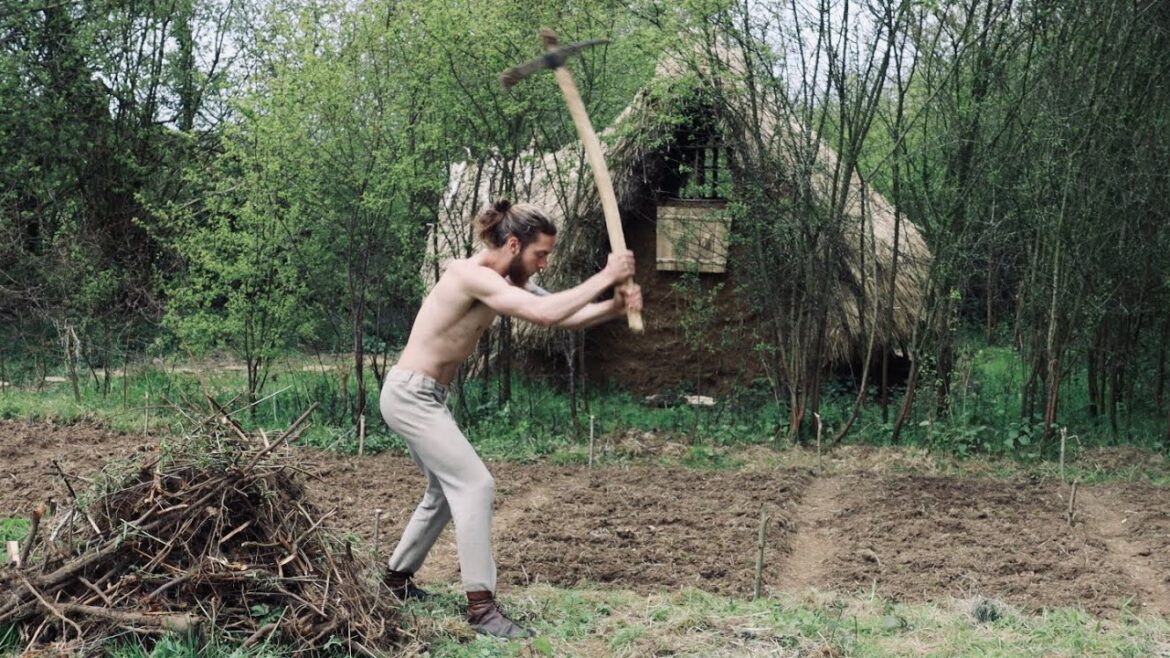Anglo-Saxon and Early Medieval settlers grew their vegetables in small garden beds or fields close to their homes. Vegetables require lots of attention, so these were grown separately where they could be well tended, rather than incorporated into larger field systems of wheat, barley, flax and legumes.
As the Gewissæ settled Somerset, forest or scrubland was often cleared to make room for settlements and crops, while livestock were grazed on upland pastures or the water meadows of the marshy Levels.
Crops such as parsnips, carrots, beetroot, onion, kale and beans were grown in small fields or raised beds, and these were sown here. The field was divided into separate beds for easy watering, weeding and slug picking.
The seeds were covered with a fine layer of soil after sowing, and watered in. A fortunate rainfall watered the seeds well after planting. During dry weather, watering will be done by hand by collected buckets of water from the stream.
In mid-7th century south west Britain, even the royal elite had not yet fully accepted Christianity, and paganism certainly still lingered among the local Anglo-Saxon population. Many farmers may have prayed to Ēostre, a Germanic fertility goddess of spring, to watch over their crops, perhaps even at the same time as praying to the Christian God.
With thanks to:
Jack Sparks, as the fellow freeman farmer.
Herknungr, Musician, playing ‘Ængleland”
If you would like to support me further, you can become a patron here:
https://www.patreon.com/gesithasgewissa
Or make a one-off donation:
https://paypal.me/gesithasgewissa
https://www.facebook.com/gesithasgewissa/
https://www.instagram.com/gesithasgewissa/
As the Gewissæ settled, forest and scrubland was cleared To allow fields to be ploughed and crops planted Vegetables were grown in small fields next to homes Rather than in larger field systems like grain and flax Sheep were grazed on the upland pastures Parsnip, carrot, beetroot, onion, kale and beans were grown Watered, weeded and slug picked by hand


20 Comments
Hi all! You can check the subtitles and description for much more detail. Thanks for watching! If you like what I do and want to support me further, consider becoming a patron: https://www.patreon.com/gesithasgewissa/
FRIEND! I totally love this series. Haven't missed one yet. But PLEASE PLEASE never use music like this again. It's the cringiest, larpiest shit of all time. I can't even bear to finish this video. Seriously…it's so bad. Ugh.
Silence is far, far better…but look, I get the idea. Maybe you want to distance yourself from that primitive technology guy. Maybe you just want SOME sound or music to break the monotony. I can dig that. Just…for the love of God and all that is holy…please don't use ANYTHING like this. It's embarrassing.
This was great, I am going to be doing a garden the Anglo Saxon way,,,,,,,,because I don't have a tiller. I loved the music, but I am old so maybe that's why I liked it.😃
I love this channel its like if the Primitive Technology channel evolved from neolithic times into the dark ages.
willow & elderberry bushes you were removing? Wow, what a lot of hard work!
fuck yeah. this channel is very cool
can anyone ID the yellow flowers at 3:19?
I hope you planted white carrot. They wouldn't have had orange carrots back then. An amazing piece of land. Slightly envious, here.
A fascinating film and I tend to agree the sound of nature does not need additions. You can gauge the degree of hard work by the sounds of the roots being hit or torn up or the soil/ stones/ clay being turned over. It is quite a thought that the Anglo/Saxons did not have potatoes or tomatoes!
TV station dont know how to make a good relax show… only you know.
Just guys being dudes in 662ad <3
Your work is brilliant and means a lot, including to me personally.
One thing and this is no criticism, just an observation, we could see you are working hard.
If you look at films of old labourers, and craftspeople, it can almost look like they are doing nothing, labourers movements are often slow and rhythmic with tiny imperceptible actions completely controlling the objective. It is said it takes ten thousand hours to learn any activity so you are not going to get the mastery of groundwork so you can move as a labourer doing that work would have done, But I thought it would be worth pointing this out.
I hope you see my comment as a help rather than a hindrance.
also to go with this think of the pace of old traditional work songs often very slow, against the pace of a bit of music that would be chosen to go with work these days. This defiantly did not mean that work progressed slower in the past, but in many ways it was often a more controlled paced effort.
make an offering to Freyr for good harvest!
I too have preferences, the main one being that you continue making videos.
These are just lovely
It seems like people comment on the music idk i liked it. These videos are put together extremely good way better than all of the video arts students i know make
Parabéns pelo vídeo
Lovely video as always. The music was very good and fitting the scene. What were you guys drinking?
the music is great actually, the combination with the hoeing gives quite an archaic vibe.
Obviously no maize, beans nor potatoes being new world. Orange carrots being a Dutch thing celebrating the Prince of Orange. Peas were possible does anyone know if sweet (wrinkled) peas had been bred yet?